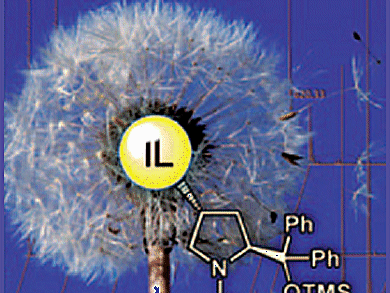Identifying “poisonous” side reactions that cause decreased catalytic efficiency are crucial to the successful application of organocatalysts.
Sergei G. Zlotin, N.D Zelinsky Institute of Organic Chemistry, Moscow, Russia, and colleagues have proposed an efficient approach to studying the transformations of supported organocatalysts in asymmetric reactions by modifying them with ionic-liquid (IL) fragments. The ionic groups (IG) aid the identification of “parasitic” side reactions by using ESI-MS analysis of recovered catalyst samples.

The approach was applied to the study of Jorgensen–Hayashi-type catalysts in asymmetric Michael reactions (see figure). Problematic side reactions, such as hydrolysis and oxidation, were identified and then solved by using an inert atmosphere to increase the operation period of the catalyst.
This approach may be useful for analysis of other types of organocatalysts and in developing robust catalysts and processes suitable for industrial applications.
- Chiral Ionic Liquid/ESI-MS Methodology as an Efficient Tool for the Study of Transformations of Supported Organocatalysts: Deactivation Pathways of Jørgensen–Hayashi-Type Catalysts in Asymmetric Michael Reactions,
O. V. Maltsev, A. O. Chizhov, and S. G. Zlotin
Chem. Eur. J. 2011, 22 (17), 6109–6117
DOI: 10.1002/chem.201100388



